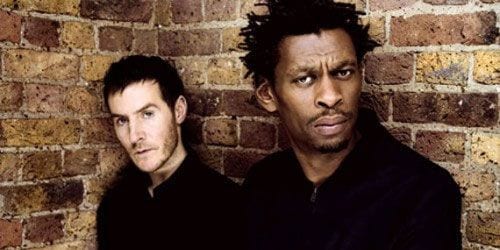
No one would have predicted it back in 1991.
In June of that year, when Massive Attack released their debut album, Blue Lines, they represented the vanguard of modern dance-based music and British pop in general. A trio of singles had established a totally fresh sound that incorporated American soul and hip-hop, dub reggae, and Burt Bacharach-style orchestration. Blue Lines set the template for every modern dance music collective, employing a succession of guest vocalists to help interpret the band’s compositions. Massive Attack’s very name was full of intimidation and portent, and why not? They had impeccable production, great songs, and a continent’s worth of cool cache. Plus Tricky, Horace Andy, Shara Nelson, and Neneh Cherry. At the time, Damon Albarn was lead singer in the British pop band Blur. About to release their own debut album, Leisure, Blur had a couple of singles and some chart success under their belt. They were, though, mostly regarded as merely one of many bands to take advantage of the British “Baggy” or “indie dance” scene that was then in full swing.
No, no one would have guessed that 19 years later, Albarn would be the Renaissance man of British music, juggling a successful record label, Honest Jon’s, and at least two successful bands, Gorillaz and the Good, the Bad and the Queen, that have expanded on Massive Attack’s innovation to commercial and critical avail. No one would have bet that Massive Attack would be the ones with a failed label, Melankolik, and would be the ones who, mired in a creative muck, would reach out to Albarn to help restore their artistic standing. But that’s exactly where things stand with Heligoland.
Massive Attack managed three game-changing albums, but it’s been 12 years since the last one, Mezzanine. By 2003’s underwhelming 100th Window, Massive Attack were a band in name only, Robert Del Naja, aka 3D, having asserted his dominance so effectively that the other two members quit. Not coincidentally, the music, though well-produced as always, was a threadbare and somewhat embarrassing attempt to capture a gravitas that seemed to be gone for good.
But then original member Daddy G returned, and 2006 single “Live with Me” effectively found the lost magic, if not the innovation. All this makes Heligoland a pretty pivotal album, with high hopes riding on its shoulders. Yet even before you hear a note, it has trappings of a disappointment. Its creation was labored, spread over much time and several studios. An initial version of the album was scrapped at the 11th hour. The list of guest vocalists, though impressive, seems like a grab for attention and credibility. And the artwork, in part by 3D, is ugly in a way that demands attention if nothing else.
The good news, then, is that Heligoland is actually a mixed bag whose best tracks come close to recapturing the spirit of Massive Attack’s ’90s work. Still in control, Del Naja has said he wanted a more stripped-back sound. This results in more punchy, beatbox rhythms, fewer samples, and some faster tempos. The music is strikingly less dense than before, though the production is as meticulous and measured as ever, but it’s also so deliberately bleak, so obvious in its intent to be capital-I Important, it all but dares you to turn your back and chuckle.
Stick with it, though, and Heligoland comes through in spots. Off-and-on Tricky muse Martina Topley-Bird lends her valium-laced sexuality to “Babel”, whose brooding minor chords in turn sound appropriate. Stalwart Horace Andy, he of the voice that can be described only as “angelic”, relates a convincing tale of lost love on “Girl I Love You”, sounding at once desperate and bewitched. Here, the band step up, too, with soulful horn blasts, a trademark yet still-genius little percussion hook, and a beautiful, haunting instrumental interlude. Yes, it’s essentially Mezzanine‘s “Angel” at a faster pace and with fewer guitars, but it still sounds fresh and welcome.
“Girl I Love You” along with a late-album trio of tracks would have made a killer EP, one that would have asserted Massive Attack’s re-emergence much more effectively than the ill-received Splitting the Atom EP released in 2009. One time Mazzy Star chanteuse Hope Sandoval, sounding virtually indistinguishable from Topley-Bird, fronts the stunning “Paradise Circus”. The lyric, something about how the Devil is bad but sin is really, you know, appealing, is trite, but the music… only Massive Attack at their best could make a three-note piano figure and some handclaps so devastating, so powerful and sad. That’s followed by “Rush Minute”, with Del Naja whispering about “beautiful clichés” over mournful, New Order-ish guitars. By its halfway point, the song has developed that pristine, chugging quality that was so effective on “Protection”. Then, Albarn. His earnest “Do you love me?” on “Saturday Come Slow” generates more pathos than the rest of the album combined. The arrangement, with acoustic guitar and simple percussion, finally makes good on Del Naja’s vision. The track could have come straight from Blur’s Think Tank, but who cares?
That’s the ultimate impression you can’t shake, though. From Shara Nelson to Tracey Thorn and even Terry Callier on “Live with Me”, Massive Attack used to make the vocalist, not the other way around. But not even TV on the Radio’s Tunde Adebimpe or Elbow’s Guy Garvey can make much out of the formless, passionless stuff they’re given. On about half of Heligoland, Massive Attack aim to frighten you, shake you to the core. But then they do the musical equivalent of throwing sheets over their heads and yelling “Boo!” Just check the over-the-top death march of “Splitting the Atom” or the carnival fun-house fiasco “Atlas Air”.
Nineteen years is an eternity in pop music. Perhaps no one would have guessed Massive Attack would still be around after such a span. Well, they still are. They’re just not as massive.
